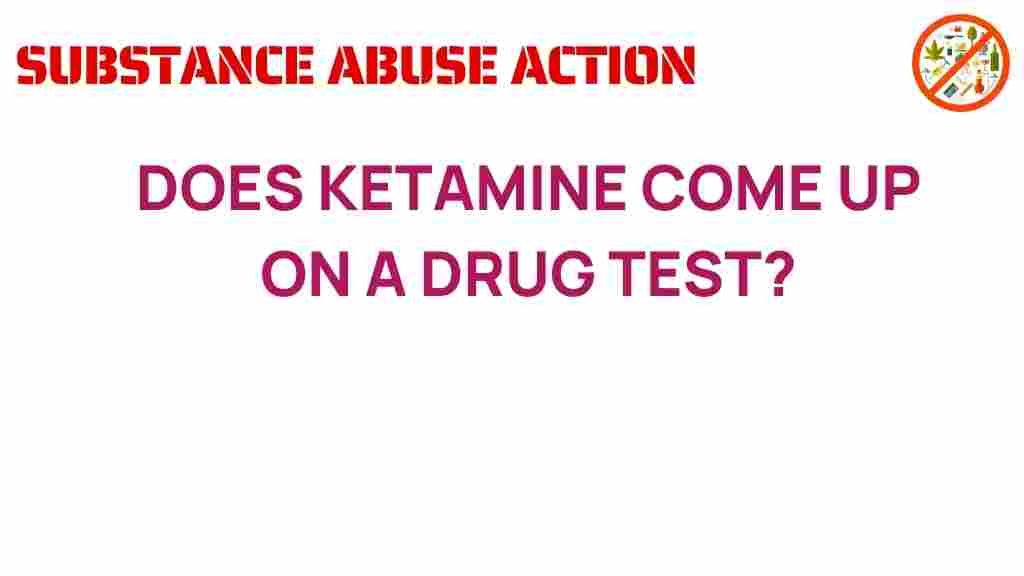Unveiling the Truth: Does Ketamine Show Up on Drug Tests?
In recent years, ketamine has gained attention not only for its medical uses but also for its recreational applications. As its popularity rises, many individuals wonder about the implications of ketamine on drug testing. This article aims to clarify the connection between ketamine, drug testing, and substance detection, particularly in the context of mental health treatment and addiction. We will explore how ketamine is screened in various drug tests, its medical and recreational use, and provide insights for those concerned about drug testing outcomes.
Understanding Ketamine
Ketamine is a dissociative anesthetic that has been used in medical settings for decades. Initially developed as a surgical anesthetic, it is now being explored for its potential in treating mental health disorders such as depression, PTSD, and anxiety. Ketamine acts on the NMDA receptor in the brain, leading to alterations in perception and mood.
While ketamine has legitimate medical uses, it is also misused recreationally, leading to its classification as a controlled substance in many regions. This duality raises important questions regarding substance detection in drug tests.
Types of Drug Tests
Drug testing can occur in various contexts, including employment screening, legal situations, and medical assessments. Understanding the types of tests available is essential for comprehending how ketamine may be detected.
- Urine Tests: The most common method for drug screening. Urinalysis can detect recent use of substances, including ketamine, typically up to 2-4 days after use.
- Blood Tests: Less common for routine screening but may be used in specific medical or legal situations. Blood tests can detect ketamine for a shorter period, usually a few hours to one day post-use.
- Saliva Tests: These tests can detect substances for a short window and are increasingly used for roadside testing in some jurisdictions.
- Hair Tests: These can provide a longer detection window, identifying substance use over several months, but they are less commonly used for ketamine testing.
Does Ketamine Show Up on Drug Tests?
The answer to whether ketamine shows up on drug tests is nuanced. Standard drug tests, particularly those used for employment screening, often do not include ketamine on their panels. These tests typically focus on more widely abused substances such as opioids, cocaine, marijuana, and amphetamines.
However, specialized drug tests can detect ketamine. For instance, if an individual is undergoing testing for substance abuse treatment or in a medical context where ketamine has been administered, specific tests can identify its presence in urine and other biological samples.
Factors Influencing Detection
Several factors can influence how long ketamine remains detectable in the body:
- Frequency of Use: Regular users may have a longer detection window compared to occasional users.
- Dosage: Higher doses can lead to more extended detection periods.
- Metabolism: Individual metabolic rates can affect how quickly substances are processed and eliminated from the body.
- Hydration Levels: Well-hydrated individuals may excrete substances more quickly than those who are dehydrated.
Ketamine in Medical Use
In medical settings, ketamine is primarily used as an anesthetic and for the treatment of severe depression and other mental health disorders. Patients receiving ketamine infusions are typically monitored, and any drug testing conducted is usually for therapeutic purposes.
Healthcare providers may screen for other substances to ensure patient safety during treatment. If you are undergoing ketamine treatment, it is crucial to discuss any drug testing policies with your healthcare provider.
Recreational Use and Risks
Despite its medical benefits, ketamine is often misused recreationally for its dissociative effects. Recreational use can lead to significant risks, including:
- Addiction: While not as addictive as some substances, repeated use can lead to psychological dependence.
- Health Risks: Adverse effects may include bladder issues, cognitive impairment, and severe dissociation.
- Legal Consequences: Possession and use of ketamine without a prescription can lead to legal issues, including fines and imprisonment.
What to Do If You’re Facing Drug Testing
If you are concerned about drug testing and have used ketamine, here are some steps to consider:
- Know the Testing Policy: Understand the specifics of the drug testing policy in your workplace or legal situation.
- Communicate with Your Healthcare Provider: If you are undergoing treatment, ensure your provider is aware of your drug use history.
- Consider Timing: If you are aware of an upcoming test, know that ketamine generally clears the system within a few days.
- Seek Support: If you are struggling with substance use, consider reaching out for professional help or support groups.
Troubleshooting Drug Testing Concerns
If you are facing drug testing and have concerns about potential ketamine detection, consider the following troubleshooting tips:
- Request a Confirmation Test: If you receive a positive result, you can often request a more specific confirmation test.
- Document Your Medical History: Keep records of any prescriptions or treatments involving ketamine.
- Consult with Legal or HR Professionals: If you are facing potential job loss or legal repercussions, it may be beneficial to seek professional advice.
Conclusion
In conclusion, while ketamine is not typically included in standard drug tests, it can be detected through specialized testing. Understanding the nuances of drug testing and the factors that affect substance detection is crucial for individuals who may be using ketamine, whether for medical or recreational purposes. If you are concerned about the implications of drug testing on your mental health treatment or potential addiction, consider consulting with a healthcare professional or therapist.
For more information on drug testing and substance use, you can visit National Institute on Drug Abuse.
If you have questions about ketamine treatment or mental health resources, feel free to explore our support services.
This article is in the category Treatment and created by SubstanceAbuseAction Team

3 thoughts on “Unveiling the Truth: Does Ketamine Show Up on Drug Tests?”